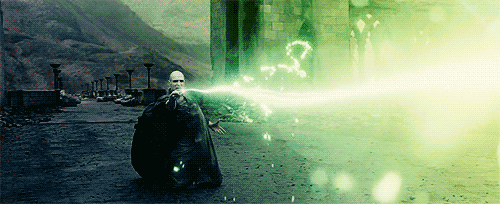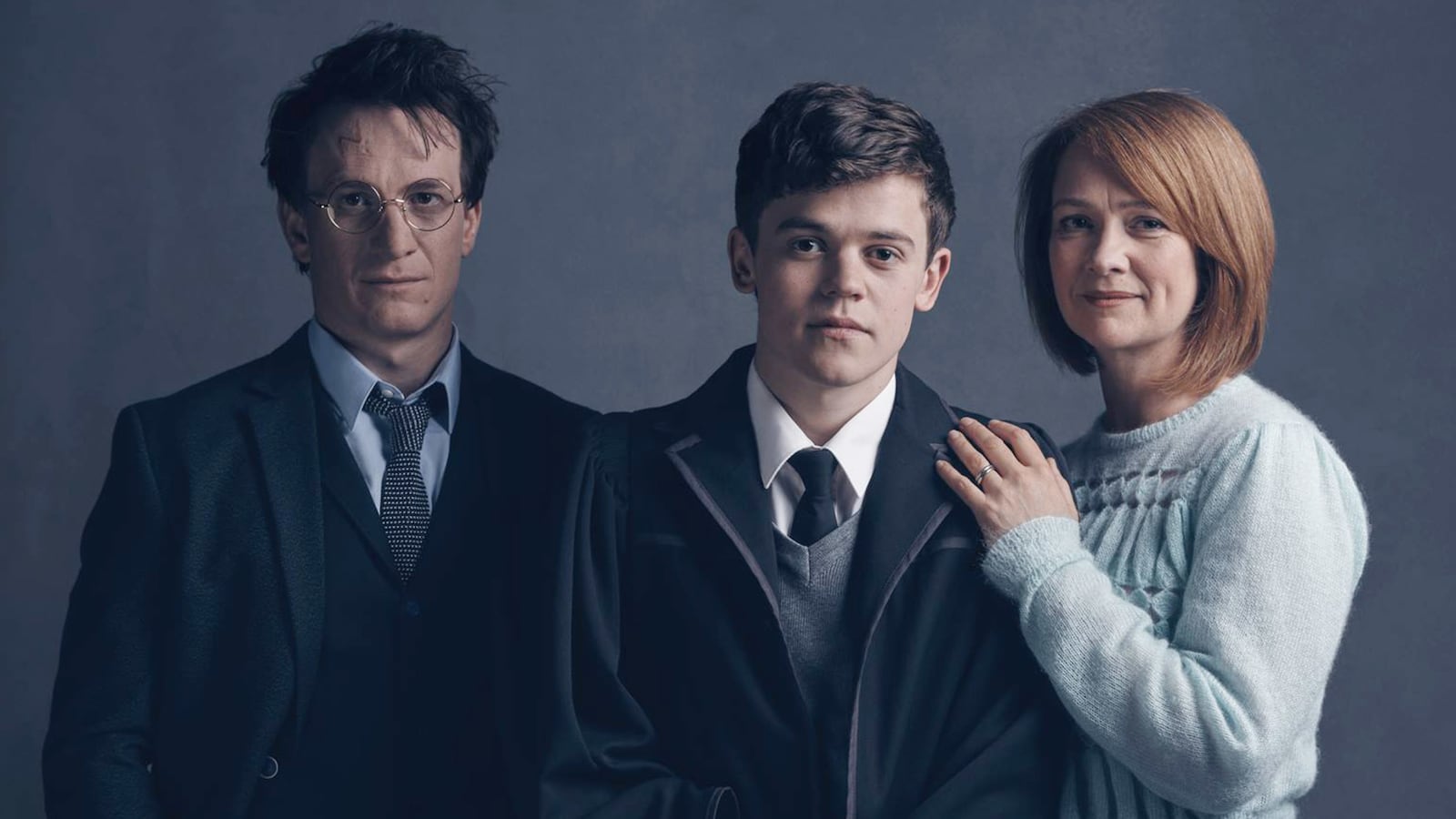(Warning: there are spoilers ahead for Cursed Child Parts One and Two!)
Harry Potter and the Cursed Child, the eighth story in J.K. Rowling’s beloved epic about the Boy Who Lived, is spellbinding in the best, most familiar of Potter ways and also completely fucking bananas in some of the worst.
It’s packed with prophecies, tragedies, hairpin plot turns, riddles, magic, and explosive revelations. Everything the series is famous for, revived and distilled into a fun and captivating—if slightly sacrilegious to Potter purists—two-part play. Some of it is so deranged it’s almost transcendent: the Trolley Witch, for instance, morphs into a terrifying monster with spiky hands who hurls pumpkin pasty grenades at children atop the Hogwarts Express. The moment is baffling, bonkers, and frankly glorious.
Then there are the more questionable elements: Ron Weasley bizarrely gifts a love potion (aka the Wizarding World equivalent to a roofie) to his teenage nephew, Albus. There’s Time-Turning, in part thanks to a secret stash of Dark Magic memorabilia Draco Malfoy never thought to tell anyone about until just now. And there’s a fascinating alternate reality in which Harry dies, Voldemort takes over the world, and Severus Snape survives—all of which hinges on the humiliation of…Cedric Diggory?
But we’re here to discuss the most WTF plot twist of all, a moment more bitterly divisive than anything in Harry Potter canon since, well, the original Book 7 epilogue that kicks off the plot of Cursed Child. I’m talking about the revelation of Voldemort’s secret love child. It’s true: The Dark Lord sired a now twenty-something daughter with his dutiful worshipper and right-hand lieutenant Bellatrix Lestrange. Surprise! Now you too have the unfortunate image of Voldemort having sex forever seared in your brain!
Delphi “Diggory,” as she first introduces herself to Albus and Draco’s son Scorpius, can fly sans broomstick and speak Parseltongue, just like Dad. She flirts with/manipulates the boys into using a Time-Turner and traveling back to 1994 to meddle with that year’s Triwizard Tournament. To fulfill a prophecy heralding Voldemort’s return, she forces them to stop Cedric from winning the Tournament with Harry, thus saving the dreamy Hufflepuff from death by the Dark Lord’s wand.

When that doesn’t work, she goes straight to the source of Voldemort’s downfall: Godric’s Hollow 1981, where Harry’s parents died to save him and where the strength of his mother’s love created a charm powerful enough to send the Dark Lord underground for 10 years. If he’d never cursed Harry, Delphi figures, Voldemort would have only grown in power—and the world would still be consumed by darkness.
That’s the “why” of Delphi, the play’s titular Cursed Child. As she confesses to a “Voldemort” who is really Harry in Transfigured disguise, “I have devoted my life to being a child you could be proud of.” She spent years in isolation from the Wizarding World then, all at once, became aware of her own destiny—a lot like Harry when he was young.
The “how” of her existence is a little bit murkier.
Delphi explains to Harry-as-Voldemort that she was born inside Malfoy Manor “before the Battle of Hogwarts.” It was Bellatrix’s husband, Rodolphus Lestrange, who filled Delphi in on her true parentage upon his return from Azkaban and told her about the resurrection prophecy he believed she’d fulfill. It’s a classic Rowling twist: new, earth-shattering information woven into a pre-existing narrative, like a crucial puzzle piece you never realized was missing. But in the case of Voldemort’s secret spawn, some fans are calling bullshit.
There is no indication in the year-long period covered by Harry Potter and the Deathly Hallows (or in the books that came before) that Bellatrix was ever pregnant. She was hardly MIA from the time she moved into Malfoy Manor: she attacked the Order of the Phoenix, killed Sirius Black, procured a copy of Gryffindor’s sword, and tortured Hermione, all before the Battle of Hogwarts.
It’s also odd to think that the Malfoys wouldn’t have known about their houseguest’s impending bundle of joy. (Do nine-month-long Confundus Charms exist?) Draco, at least, fails to mention it in either book—though Cursed Child, to be fair, does give him a compelling reason not to: he hates rumors of Voldemort’s baby because his son, Scorpius, is rumored to be the No. 1 contender and has long been bullied for it. (Even if Draco knew, after all, he couldn’t have proved it since Delphi went missing for so long.)

Still, Voldemort and Bellatrix did share a, uh, connection: after Voldemort is knocked to the ground near the end of Deathly Hallows, a voice murmurs, “My Lord…my Lord…” Rowling writes: “It was Bellatrix’s voice, and she spoke as if to a lover.” Rowling confirmed Bellatrix’s unrequited love for Voldemort in a 2007 PotterCast interview, saying, “Bellatrix is madly, romantically in love with Voldemort…She’s madly in love with this man, and obsessed by him.”
And what about poor Rodolphus? “[Bellatrix] took a pureblood husband, because that was what was expected of her, but her true love was always Voldemort,” Rowling said in a live chat that same year.
We can be sure Voldemort never loved Bellatrix back—his greatest weakness, after all, was his chronic inability to understand love and friendship—but Bellatrix’s death did get a reaction out of him: he screams at “the fall of his last, best lieutenant” and his fury “explode[s] with the force of a bomb.” How that translates into the pair bumping uglies at one point (did…did he even have an ugly?) is left to the reader’s imagination. It was never explicitly ruled out.
But more than issues of canonicity, perhaps the root of fans’ dissatisfaction over this fanfic-wannabe turn is that, really, Delphi is sort of a lame villain—at least in print. She takes advantage of a schoolboy’s crush, leaves secrets literally written on the walls of her room, murders a character we’ve barely heard of, and instantly caves the moment she’s captured. (“Truly pitiful,” stage directions helpfully tell us about her demeanor.)
Onstage with effects, surely, she’s intimidating. On the page, she’s little more than another angry, lonely kid who feels isolated from where she came from—just like Harry’s son Albus, just like Draco in his Hogwarts years, just like young Tom Riddle. There’s a symmetry to it, but after twenty-odd years of terror from Voldemort and his Death Eaters, some Harry Potter fans might have been hoping for something different this time around.
For now, those hopes have been dashed; Rowling swears (for real for real this time) that Cursed Child is her last story about the Boy Who Lived. But perhaps dipping back into the Voldemort bloodline isn’t proof of unoriginality—maybe it’s just good timing: a tyrannical figure who thrives on fear and exclusion resonates as a villain now more than ever before. And the lessons Harry Potter strives to teach bear repeating.






